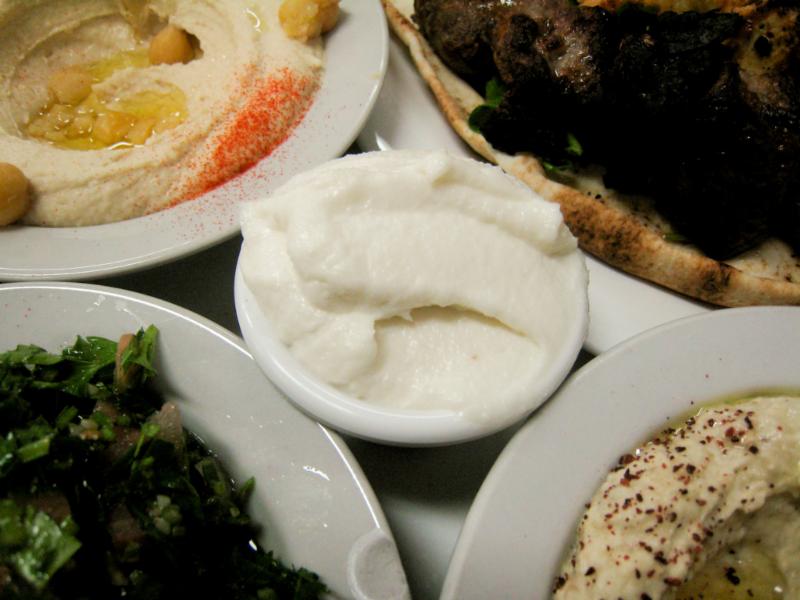That Toum: Lebanese Garlic Sauce
by Ari LeVaux
Garlic season is upon us, which means that last year’s garlic will be on sale alongside the new crop. Don’t be fooled by a sale price; squeeze each head you buy. It should be as hard as a baseball. If not, there is probably a green sprout inside each clove.
There are so many things worth doing with fresh garlic, there’s little need for extra motivation. But I’m going to share something that I just learned, a recipe for a garlic sauce that is so much better than you or anybody else deserves to eat. A glorious sauce that seems to defy the laws of physics, as well as the culinary universe.
I first encountered “Garlic Sauce,” as it was labeled, a few blocks away from my parents’ house on the west side of Boston, where there are a few blocks of what we call the Armenian area. The food available in those markets is a mix of Middle Eastern, Central Asian and Southern Caucuses, thanks to the wide path carved by the Armenian diaspora. Whenever I’m in town, I head for the Armenian markets, and their endlessly fascinating aisles of fresh, canned, bottled, dried and pickled foods. I’ll go ostensibly for a stuffed eggplant, maybe a box of cardamom tea and some baklava. But I’m really there for the promise of discovery, and the possibility that I may stumble upon some unknown delicacy or ingredient that rocks my world.
The yogurt options, including kefir cheese, are varied and spectacular and creamy. The many formulations of chocolate, which include Nutella-like substances labeled in Cyrillic and other chocolate creamy and wafer-y options, are a joy to explore as well. But my biggest score ever happened last week, at a Lebanese-owned Armenian store called Arax, where I found a garlic sauce that handles and tastes like mayo.
It…is mayo, actually. Sort of. I am an expert on mayonnaise, so I would know.

It’s called toum, a word that can be used interchangeably in Arabic to mean both garlic and the special crème in question. And, as can happen with other condiments-as mayo does with me-the condiment itself becomes the reason to eat the food it’s ostensibly there to flavor.
Mayonnaise is an emulsion, a mixture of oil and lemon juice (or vinegar) that won’t easily separate. This stable bond is brokered by yolk, which is a powerful emulsifier. Toum is an emulsion as well, between oil and lemon, but is brokered by garlic, which is an emulsifier as well.
There are many competing theories as to the origin of mayonnaise, but the most credible theory I can find is that it evolved from allioli, an emulsion of olive oil and lemon juice, with garlic and salt. Mayonnaise was born when it was discovered yolk is a more powerful emulsifier than garlic. Yolk, in other words, presented a short cut.
When, at the Armenian store, I read the ingredients of “Garlic Sauce,” I felt like an archaeologist discovering some important artifact at a flea market. Getting information from the staff on how it was made was like pulling teeth, but I at least walked out of there with its real name. And the sauce itself, which was as glorious and versatile as I expected.
Some people add egg whites, mashed potatoes, bread, flour, corn or potato starch, and other thickeners to their toum. I do not. I keep it old school, in the original Mediterranean tradition.
The sauce will improve anything that goes in your mouth, including grilled food, barbeque, fish chicken, pizza, pasta, vegetables, even soup. It’s a great marinade too. Once you’ve got your toum you can do anything.
Mix some with tahini and yogurt, and toss with sliced cucumbers, minced mint, a sprinkle of cumin and a squeeze of lemon, for a refreshing summer salad.
And here, at long last, is a recipe for toum, that creamy, fluffy mountain of flavor.
Toum
Ingredients
One cup of fresh, freshly peeled garlic. Cut the scabs off the clove bottoms.
Two teaspoons salt.
One half cup fresh squeezed lemon juice.
Four cups oil. Canola or vegetable or corn oils, and other such refined, odorless, arguably nasty oils are popular among many New World toum formulations, and many avoid olive oil for its color and flavor. Not me, even though my toum isn’t as bright white as it could be.
Procedure
Make sure all utensils are dry, and don’t let any water touch any of the ingredients.
Add the salt and garlic to a dry food processor and pulse four times, about five seconds per pulse. Scrape down the garlic with a spatula. Run the food processor again until it’s all stuck on the side, and scrape it down one last time.
Now, turn the processor to on and leave it there.
Add a half cup of oil, slowly, in a very thin stream. Then add two teaspoons lemon juice, and another half cup, slowly, also in a thin stream. Then two more teaspoons lemon juice, and another half-cup oil, and another two teaspoons lemon juice, etc. Continue this cycle until the oil and lemon juice are done, speeding up incrementally with each pour of oil.
It will get progressively fluffy, until the processor is nearly full of this fabulous substance.
Transfer to a container and let it cool in the fridge, uncovered, or covered with a paper towel (to avoid condensation dripping down into the toum, which would cause it to separate). After it’s cool, cover it, and let it sit overnight before using. It will last a month or longer in the fridge. Except, well, it won’t last long at all.

